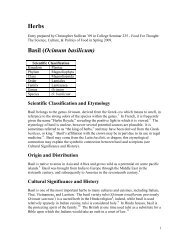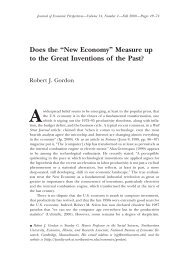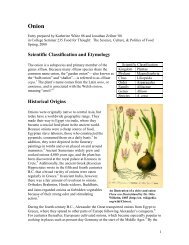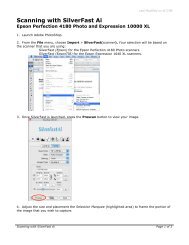Classical Mechanics (PHYS 350) Course Syllabus - Academics
Classical Mechanics (PHYS 350) Course Syllabus - Academics
Classical Mechanics (PHYS 350) Course Syllabus - Academics
You also want an ePaper? Increase the reach of your titles
YUMPU automatically turns print PDFs into web optimized ePapers that Google loves.
2<br />
2. Seminars:<br />
My Platonic Ideal of The Seminar: The professor provides a detailed syllabus of a subject which,<br />
if followed carefully, will build a solid foundation of the subject. The students, working together with<br />
the professor, learn and present the material in class in a way which is clear to everyone. Discussion is<br />
active, intellectually challenging, non-threatening, and pushes the envelope of everyones understanding.<br />
In preparation every member has no problem asking others about a solution, an integral, or definition<br />
whether it is in class or in the dining halls. In seminar any remaining questions are discussed in depth<br />
resulting in new insights which, naturally, arrive with a blinding flash of light.<br />
The typical seminar consists of a series of solutions and 10-15 minute presentations punctuated by<br />
discussion. We all contribute but I emphasize the complete reversal of roles. You take an active role<br />
in teaching yourselves. It is your class! There is but one rule: Except for your final toy presentation<br />
when you may use it if you’d like, there will be no PowerPoint presentations.<br />
Here are a few suggestions to help you along. Slogans lead the more detailed descriptions.<br />
(1) Start early. Work slowly and carefully. Nothing will help you better than to start preparing for<br />
seminar early. As good as they are, these chapters are not short stories; it would be unpleasant<br />
to read the entire chapter in one sitting. Further, read with a scratch pad and writing utensil;<br />
work through the presentation of the text. Schedule in plenty of time.<br />
(2) Do all the problems. Dance is not learned by only watching a video; physics is not learned by<br />
only reading. To learn the subject one must try out the stuff by talking and writing about it<br />
and working through problems. For many of us this process has two purposes. One is to gain<br />
mathematical fluency. The other is to find the physics in the mathematics.<br />
(3) Minimize frustration!’ One of the aspects of the seminar experience that took me the longest<br />
to learn was the utility of asking a question. If you encounter difficulty, carefully formulate a<br />
question (often the question answers itself in this process!), then ask someone. If this person is<br />
madly preparing a midterm or a French buttercream or does not know the answer, try someone<br />
else. In particular do not hesitate to ask me (Science G052, x4919, smajor). If all else fails, go<br />
on to other problems and return to the question later.<br />
(4) Write clean and clear solutions When writing solutions keep in mind that there is also a large<br />
difference in sketching a solution on your napkin at dinner and writing up the solution so that<br />
someone can read it (and that may include you!) As with much writing, keep your audience in<br />
mind. Keep your classmates in mind but also try thinking of yourself in 3 months. The logical<br />
argument of your solution should be clear on a first read.<br />
(5) For presentations: Be clear. To impress, exhibit novelty. Much of what is true for solutions<br />
also applies to presentations. Clearly state the issue or problem, outline the tools needed, and<br />
proceed providing information when needed. Feel free to skip algebraic steps once you have<br />
cleared it with the class. Show us (including me) something we don’t already know, e.g. a new<br />
numerical solution or a experimental manifestation of a problem.<br />
(6) Preserve class notes The best policy is to prepare fully for seminar before we meet and write<br />
up summaries and/or complete solutions after the actual seminar. It is not easy to keep up.<br />
But your notes will be loads of help for graduate school classes, qualifying exams, and even<br />
when you teach this course! Think of this as writing up notes from which you can relearn the<br />
subject.<br />
(7) Be clear about what you understand and what you don’t It is never too early (or too late) to<br />
start being clear about what you understand and what you do not. There is a vast, amorphous<br />
plain between familiarity and understanding. Question your own understanding by trying it<br />
out on new situations. If your knowledge is not what is required, find the difference and learn<br />
from it.






